- Home
- Anne Bennett
A Mother's Spirit Page 3
A Mother's Spirit Read online
Page 3
A pint of cold Guinness would have gone down a treat, but Joe couldn’t see anything remotely like that and Brian, seeing his dilemma and guessing how he was feeling, said, ‘Will you join me in a whiskey?’
Joe sighed inwardly. Whiskey at least he knew, though he hadn’t drunk it often, so he said, ‘A whiskey, sir, would be very good.’
A young maid dressed in a white apron over her black frock appeared then. ‘Ah Mary,’ Brian said, passing the paper into her hand, ‘give this to McManus. Tell him to go to this address and inform a Mr Patrick Lacey that his friend, Mr Joe Sullivan, is dining with us this evening.’
Mary gave a little bob as she took the letter from Brian, and Joe realised how easy life was for a person rich enough to employ a bevy of servants.
‘Now,’ said Brian, passing a generous glass of whiskey to Joe, ‘Sit down, make yourself comfortable and tell me a bit about yourself.’
Joe sat very gingerly on the gold suite, and told Brian of the small town of Buncrana in northern Donegal and the farm near to it where he had been born and reared. He went on to tell him of his young brother, Finn, who had enlisted in the Great War and was killed in 1916, and his elder brother, Tom, who now owned the farm after the death of his father, and his sister Nuala living in Birmingham, England. He didn’t speak of Nuala wanting to marry a Protestant man, or that when she wrote the news of this to her parents her father had had a heart attack and died with the letter still in his hand.
Nor did he say that his mother, who had become almost unbearable to live with, had disowned Nuala because she blamed her for her father’s death, and he never mentioned Aggie, his eldest sister, either – another one his mother disowned – who had run away from home when he was just a boy, because these were personal family matters and not for sharing.
‘The place was not the same at all after Daddy died,’ Joe told Brian and Norah. ‘It was as if the heart had gone out of the place. And then I felt that life was passing me by and, well, I was breaking my back for a farm that would never be mine and so I decided to give America a try.’
‘And how did your brother take that news?’ Brian asked.
‘Oh, Tom understood,’ Joe said. ‘In fact he—’ But Joe got no further for at that moment the doorbell rang.
Knowing that it was probably the doctor, Norah was crossing the room before the maid appeared at the door. ‘Have to leave you to your own devices, Mr Sullivan,’ Brian said.
‘Don’t worry, sir, really,’ Joe said. ‘I am anxious as you are to hear what the doctor has to say about your daughter.’
‘Help yourself to another drink and make yourself comfortable,’ Brian said as he left. ‘We will both be back directly.’
Joe didn’t help himself to a drink, but sipped the one he had slowly as he again looked about the room in wonder. He thought of his brother on the farm and what he would say if he saw him now, sitting in such a room in such a house, as if he had a perfect right to be there, and supping whiskey, no less.
He knew that Tom, in similar circumstances, would probably be paralysed with shock and fear, and unable to take joy in any of it. He, on the other hand, intended to make the most of every minute because he knew it would be nothing more than a glimpse into how the toffs lived, and that when this bizarre day was at an end, his life would return to normal.
The doctor stayed about half an hour and by that time Joe’s stomach had begun to grumble.
‘The news is good,’ Brian said as he re-entered the room. ‘The doctor said there were no bones broken. Of course the poor girl is bruised all over and badly shaken up, and might be slightly concussed, but he said there’s nothing a few days in bed won’t cure.’
‘I’m pleased, sir,’ Joe said with a smile. ‘You must both be very relieved.’
‘We are,’ Brian answered. ‘I told the doctor what you did and he said you undoubtedly saved Gloria from a much greater injury. Now, I suggest that I let Cook know that we will be ready for dinner in half an hour or so.’
The dining room was even more opulent than the drawing room. It was dominated by a large table laid with a white lace cloth, and more cutlery and glasses than Joe had ever seen in his life. He knew that he would have to watch and copy Brian’s use of them very carefully or risk making an utter fool of himself.
Before they had the chance to start their meal, though, there was a knock at the door and the butler came in and said that Bert Clifford was outside and would like a word. Brian was on his feet immediately. ‘Excuse me,’ he said throwing his napkin down onto the table. ‘He probably has news of Tim.’
Brian’s face when he returned was very grave. ‘The news is that Tim has a fractured skull,’ he said, ‘and it’s touch and go whether he will pull through at all, or if he will be any use if he does survive. It is a terrible tragedy altogether.’
‘Has he a family?’ Joe asked.
‘No,’ Brian said. ‘He has always lived alone in a little place above the stables. I will go up to the hospital myself tomorrow, have a word with the doctors and see what’s the prognosis, but for the moment I am without someone to see to the horses.’
And then he took Joe totally by surprise by asking, ‘What about you, Mr Sullivan? Could you take over for a few days until we find out what’s what with Tim?’
‘Me, sir?’
‘You seem to know about horses.’
‘Not horses like these, though, sir,’ Joe said. ‘I only had dealings with farm horses, not thoroughbreds, and then only one at a time.’
‘I thought many of our countrymen did a study of thoroughbred horses, especially those thundering around a race track.’
‘You are right, sir,’ Joe said, ‘but not me. I have never backed a horse in my life. There was little money, for one thing, and I have never liked the idea of throwing hard-earned money away. So you see, sir, I wouldn’t be the man for you at all.’
‘You are exactly the man,’ Brian said. ‘These are not racehorses, and I need no gambler in my employ.’
Joe didn’t know how to get out of this because he was sure that Brian thought he had more expertise than he had, but how could he refuse? Wouldn’t he scupper his chances of employment of any kind if he did? And then there was Patrick Lacey. ‘I’d like to help you out, sir, really I would, but you see, my sponsor may have already arranged a place to stay and—’
‘Naturally he would be informed of the change of plan if you agree to do it.’
Despite the benign look on Brian’s face, Joe saw the determination to have his own way in his steely brown eyes and heard it in his voice. Patrick would be informed, not asked if that was all right or convenient. That was the rich for you.
He suppressed the sigh as he asked, ‘How many horses are we talking about, sir?’
‘Not that many,’ Brian said reassuringly. ‘There’s Gloria’s pony, Bramble – the one you stopped so admirably today
– my hunter, the matching pair for the large carriage and the mare Norah likes, which often pulls the small dogcart. Think about it, for you would be getting me out of a fix, and you seem to have a fine empathy with horses.’ Joe’s heart sank. Five horses and all thoroughbreds, he could bet, and he hadn’t a clue how to deal with them.
‘Mr Brannigan,’ he admitted, ‘I have never even saddled a horse in my life. If we rode one at all, it was bareback.’
‘Well, you can learn, man,’ Brian said. ‘It’s not hard, and you will have the stable lad, Bobby, to help you. What that boy doesn’t know about horses isn’t worth knowing. What do you say?’
There was nothing Joe could say but yes. He had known from the start that he would have to agree to anything Brian planned. Joe could not afford to upset him, for he held his future in the palm of his hand.
‘Right, that’s settled then,’ Brian said, beaming approval. ‘After the meal I will send my man McManus to your sponsor’s house again to tell him of the change of plan and have a room made ready for you in the basement with the other servants. Then early tomorrow
I want you to fetch the carriage back from the docks.’
‘Yes, sir,’ said Joe, and though nervous of doing a job he knew so little about, he was relieved to have employment and a place that night to lay his head.
‘Mind you,’ Brian went on, ‘I think the day of the horse, except for recreational use, is at an end. It is getting too dangerous to take them on to the streets these days, and I have ordered myself a motor car, so that will mean the carriage and the matching pair will probably be leaving us.’ He leaned towards his wife and, seeing her disgruntled look, said, ‘Do take that frown from your face, my dear. I have made my views abundantly clear. In fact, Bramble too is on borrowed time,’ he added, turning back to Joe.
‘Not because of the incident earlier, sir?’ Joe asked.
‘No,’ Brian said. ‘That really wasn’t the pony’s fault, but Gloria has nearly outgrown him now anyway, and then after Christmas she is off to a convent school in Madison. If she wants to ride when she comes home in the holidays then I will hire from the local riding school. So whoever is taken on in the stables will have to see to the car too, of course.’
‘Tim won’t do that,’ Norah said. ‘You know he won’t.’
‘Well, you can’t teach old dogs new tricks, I suppose,’ Brian said. ‘In fact, I have been thinking that it was about time Tim was pensioned off. If he pulls through from this then I will talk it over with him. I’ve no idea how old he is, but he is no spring chicken and I’ll see to it that he is all right.’
Norah laughed. ‘I wish you well of it,’ she said, ‘because he won’t take kindly to that.’
‘Then that will be an obstacle to overcome in the future,’ Brian said. ‘What I want to know, Joe, is what do you think of me getting a car?’
Joe didn’t know how to answer this because he was far more nervous of dealing with a car than horses of any description. At least they were familiar. In the end he said, ‘I … I don’t really know what to think, sir.’
‘Think you could drive a car, Joe?’
‘Oh, I really don’t know about that, sir,’ Joe said agitatedly. ‘I have never had anything to do with cars.’
‘Not many have,’ Brian said. ‘Let’s just say that you are not opposed to the motor car, which will soon be the only way to travel around this city and any other too?’
‘No, sir,’ Joe said. ‘It’s progress, I suppose, like the steam ships taking over from the old sailing ships.’
‘That’s true enough,’ Brian said. ‘What I am asking you, Joe Sullivan, is when the car I have ordered is delivered, are you prepared to learn to drive it so that you can take me to the factory each day and bring me home each evening?’
Joe thought about it, but not for very long, because in his heart of hearts he thought he would probably settle to it better than factory work. He knew too that Brian wanted him to do this for him and he was a man used to getting his own way. If he refused he’d get someone else who was willing to do it and that would be an opportunity lost to Joe, and he sensed that Brian would be disappointed in him. So he said, ‘This seems to be a country where life refuses to stand still so I am willing to learn to drive a car if you want me to.’
‘Can’t say fairer than that,’ Brian said in approval, and he clapped Joe on the shoulder.
THREE
After dinner that first evening, Planchard introduced Joe to the rest of the staff. They had heard how he had rescued Miss Gloria, and at great risk to his own life, and so he was welcomed as something of a hero. Joe hadn’t grown up in a home where praise was customary and so he was embarrassed at the fuss made. He was also very tired, and was pleasantly surprised to be shown to the room in the basement that, Planchard told him, Mr Brannigan senior had specially built to house the servants.
He didn’t notice that it was basic and spartan, for he’d never had a bed, never mind a whole room, to himself before. And it had everything he needed. It housed an iron bedstead, a chest of drawers and a hanging rail, and to him it was like a little palace. He lay in that comfortable bed that first night amongst crisp clean sheets, under plenty of warm blankets covered with a bedspread, and was so happy that he had taken the plunge and come to America. He had the feeling that this was the sort of country where anything could happen, a true land of opportunity.
The following morning, Brian ordered a taxi for himself and Joe, using a telephone that he had had fitted in the house. Joe was astounded when he told him this.
‘You mean, sir, that you can just pick up a machine and talk to people miles away?’
Brian smiled at Joe’s astonished face. ‘That is the general idea,’ he said. ‘How else would the taxi firm know that I wanted them this morning?’
‘It’s almost unbelievable to me, sir,’ Joe said. ‘I know that you said I was to go into New York this morning to fetch the carriage back and I wasn’t sure how I was going to go in except maybe to use one of those frightening tram cars.’
‘No, Joe, not this morning,’ Brian said. ‘Though you will have to get to grips with those sooner or later. Today I am going with you because I want to see how Tim is faring. And don’t be in too much of a hurry to fetch the carriage back. Familiarise yourself with the place before you collect it because as it is Saturday today I will not be going to work and will have no urgent need of it.’
‘Thank you, sir,’ Joe said, grateful for his employer’s consideration, because he had had only a glimpse of the city as the taxi had sped through the deepening dusk the evening before and he was dying to see more of it.
Just a short while later, after his second ride in a taxi, he stepped from it onto one of the crowded streets and looked about him. He could hardly believe that he was here at last, standing in New York City.
Used to winding country lanes, he was fascinated by the wide and perfectly straight streets and the way many of them had numbers instead of names. The city’s skyscrapers towered above him, and the size and variety of the shops and the goods they had on sale in their huge glass windows fairly dazzled him.
To all sides, people, seemingly of every colour and creed, thronged the pavements which Joe had heard tell were called sidewalks. He noted that though many folk spoke with the American drawl, there were plenty more with foreign accents or inflexions in their speech, and he knew it wasn’t just the Irish who were flooding American shores. New York truly was a cosmopolitan city and he felt privileged to be part of this New World. He vowed to store it all up to tell Tom in his letters home.
When he arrived back, later that morning, it was to learn that Tim the coachman had died in the night.
‘Poor fellow,’ McManus said. ‘Been here years, and then to end his days like that …’
All the staff were upset over Tim’s death, as was Brian Brannigan, although he was heartily glad that Joe had agreed to step into Tim’s shoes. Joe had surprised himself that morning by quite enjoying bringing the pony and carriage home. Bramble was a lovely little pony when he was not spooked by anything, and rattled along at a fair old rate.
Joe couldn’t help comparing Bramble to the farm horses back home. Their top speed was little faster than a man could walk briskly. He did agree with Brian, though, that the city streets were not so safe for horses any more. Soon Bramble would be sold on and it would be a car that Joe would be driving. That thought was a scary one. However, for now he had to care for the horses and it was Joe who drove the sombre Brannigan family to St Bridget’s church a few days later for Tim’s funeral.
The next day was Thanksgiving and a half-day off for Joe. And so, after tasting such delights as apple and butternut squash soup, pumpkin pie and Mayflower pudding, he decided to look up Patrick Lacey. He braced himself and went into the city on his first tramcar. Patrick lived in a downtown tenement, and McManus had given Joe instructions on how to find him in that maze of streets on the East Side. He found 57 Orchard Street fairly easily, but stood outside it for a moment or two, surprised by its seediness. It had not been what he had expected at all in this brave new
world.
The tenement was just one of many, and built of dull grey brick, with an iron fire escape fitted to the side of it, running down to the ground, and which, to Joe’s surprise, was festooned with washing. There were few people about, but then the day wasn’t a pleasant one and the other servants had told him that on Thanksgiving Day most people got together with their families if they had any close by.
As he entered the tenement door, his nostrils were immediately assailed by a pungent smell that came, he supposed, from so many people crowded in together and he was glad that the smell got fainter when he reached the third floor where Patrick’s rooms were.
Patrick was delighted to see him and Joe noted his friend seemed taller somehow, and certainly broader than the man he remembered leaving Ireland’s shores.
‘Well, the American life seems to suit you well enough,’ he said as Patrick drew him inside. ‘You’re looking grand.’
‘Never mind me, you old codger,’ Patrick said. ‘Sit you down there and I will rustle us up some tea and then maybe you will tell me what has happened to you because all I have had so far is cryptic messages.’
Joe sat down on the battered sofa and in no time was nursing a cup of hot strong tea and regaling Patrick with his adventures since the incident at the docks.
Patrick listened flabbergasted. ‘You are one lucky sod,’ he remarked good-naturedly when Joe had finished. ‘Tom always used to say if you fell in a dung heap, you would come up smelling of roses and he is damned right.’
‘I can’t help being in the right place at the right time.’
‘Where was the imperilled heiress when I was ready to disembark?’ Patrick asked. ‘That’s what I want to know.’
‘If there wasn’t one, then there wasn’t one,’ Joe replied with a grin. ‘I’d say that heiresses, imperilled or otherwise, are in pretty short supply, and you can’t lay the blame for that at my door either.’

 As Time Goes By
As Time Goes By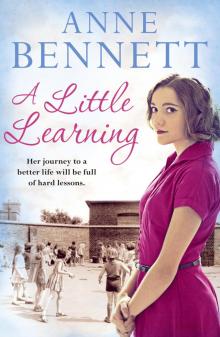 A Little Learning
A Little Learning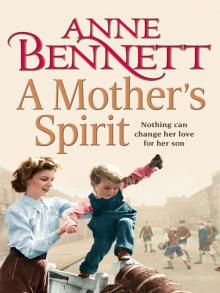 A Mother's Spirit
A Mother's Spirit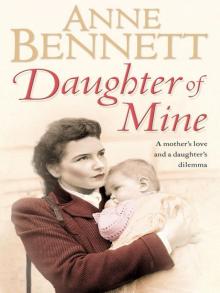 Daughter of Mine
Daughter of Mine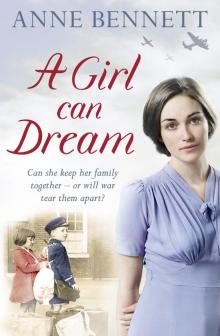 A Girl Can Dream
A Girl Can Dream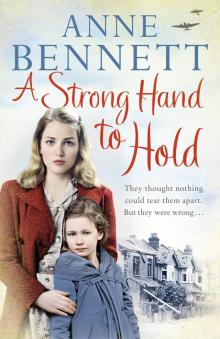 A Strong Hand to Hold
A Strong Hand to Hold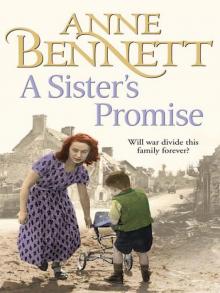 A Sister's Promise
A Sister's Promise To Have and to Hold
To Have and to Hold Pack Up Your Troubles
Pack Up Your Troubles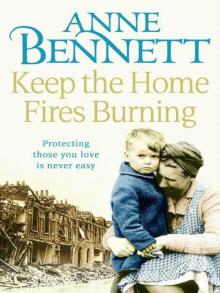 Keep the Home Fires Burning
Keep the Home Fires Burning Another Man's Child
Another Man's Child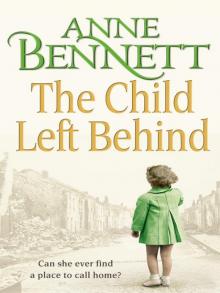 The Child Left Behind
The Child Left Behind Mother’s Only Child
Mother’s Only Child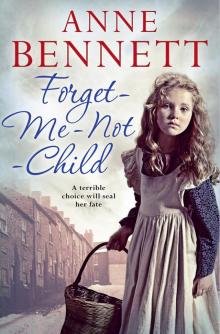 Forget-Me-Not Child
Forget-Me-Not Child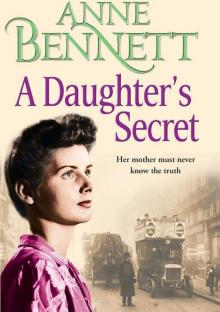 A Daughter's Secret
A Daughter's Secret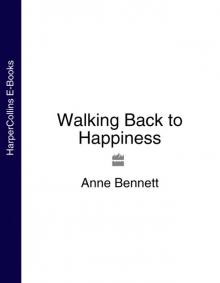 Walking Back to Happiness
Walking Back to Happiness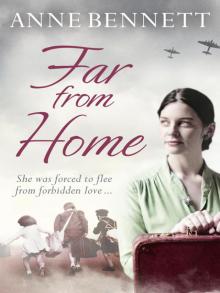 Far From Home
Far From Home Till the Sun Shines Through
Till the Sun Shines Through